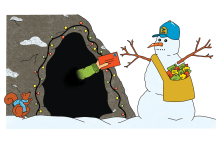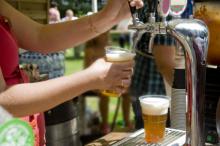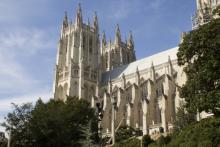fundraising

DECEMBER IS A stressful time for fundraisers, as a significant percentage of most nonprofits’ annual revenue comes in during the holiday season. We made a mistake this month when we asked Beth, who does much of Sojourners’ online fundraising, to write a humor column for this issue. Instead of a humor column, she sent us the following, in an envelope with a return address of “a cave in the woods; do not look for me.” We hope she’s doing okay. — The Editors
Dear Potential Supporter,
Now more than ever. This holiday season. In this moment, this urgent time, the most crucial of moments that all of us are in, right now. (Yes, you too.) Now — today — more than ever — Sojourners needs your year-end donation.
Did you know that the average American hears the phrase “now more than ever” 500 times a day? Did you know that all other organizations who use the phrase “now more than ever” are copying us, and we used it first? (Did you know that I, a fundraising professional hiding inside a cave, am both deeply normal and a trustworthy source of information?)

The past few months have flown by in true whirlwind fashion (my co-worker Katie aptly describes the professional whirlwind here). And as the hours tick down to the end of 2013, I find myself facing a bit of a personal whirlwind, surrounded by boxes, bins and far more hangers of clothes than I’m happy to admit. I am thick in the middle of a move, in what I’m calling my boomerang return to D.C. and Sojourners, after a three-year hiatus in the great Northeast.
As I pack up all my belongings, it’s becoming clear that books dominate an absurd amount of bins and boxes — turns out I have a penchant for the printed word (if moving isn’t a compelling argument for a Kindle, I surely don’t know what is). Therefore, it feels appropriate and timely to reflect on which of these titles affected me most this past year. As the director of Major Gifts (and newest member of the team), I’ve been particularly consumed with thinking through resource distribution, stewardship, and the power of the purse, so it is with this lens that I share my top reads of 2013.

The Archdiocese of St. Louis is putting an end to alcohol sales at youth-related events.
Under a new policy that goes into effect Friday, drinking will not be allowed at any event that is directed primarily toward minors.
That means parents will no longer be allowed to throw back a few beers during their kids’ soccer, volleyball, and softball games. And athletic associations will no longer rake in revenue from beer sales at their concession stands.

WASHINGTON, D.C. — It took 83 years to build the iconic Washington National Cathedral, but a rare East Coast earthquake last summer took just seconds to send carved stone finials tumbling from the heavens to the ground below.
Now, six months after the 5.8-magnitude quake, the cathedral is facing repair costs of at least $20 million, and a reconstruction timeline that could stretch out a decade or more.
The bill to fix the iconic church is now at least $5 million more than original estimates, said church officials, who are still working to stabilize the building, repair its intricate stonework and raise money to continue the restoration.
So far, donations for repairs have reached $2 million, or 10 percent of the predicted cost.

It’s been several years since I’ve attended a National Prayer Breakfast, the annual event held Thursday morning in Washington, D.C., attended by the President, members of Congress, and guests — about 2,500 of them.
When I lived and worked in D.C. I attended almost every year. Senator Mark Hatfield, for whom I worked, was a faithful member of the Senate Prayer breakfast group which met weekly, and with the group in the House, sponsors the this national event.
My worry always has been that such a gathering merely sprinkles holy water on the nation’s powerful leaders without any real accountability to the prophetic message of the Gospel. As a breakfast speaker one year, Hatfield called for national repentance for arrogance and sin, referring especially to the Vietnam War. His comments broke with the normal rhetorical decorum of the event and angered President Nixon, but received widespread coverage and much respect.
These days, the early-morning prayer breakfast is also accompanied by countless luncheons, dinners, and seminars for people who come from around the nation and the world to attend. The idea behind the prayer breakfast movement is simple: Gather politicians and leaders together in a country (or state, or city) to pray with one another “in the Spirit of Jesus,” and hope that this dependence on God will transcend differences to build a movement grounded in love for one another and one’s neighbor. It’s supposed to be devoid of “politics.”